GNED 1301: International Trade, Fair Trade, and the Third World
VerifiedAdded on 2022/08/18
|6
|1256
|14
Report
AI Summary
This report delves into the multifaceted effects of globalization on international trade, focusing on the principles and implications of fair trade. It examines the impact of globalization on developing countries and small producers, illustrating how fair trade coffee, designed to benefit farmers, can paradoxically lead to lower profits due to global price fluctuations. The report also analyzes the prevalence of sweatshops in the US, specifically highlighting the garment industry and the exploitation of workers by major retailers like Fashion Nova. Furthermore, it investigates the conditions of garment workers in India, who face low wages and poor working conditions. The conclusion emphasizes how globalization can lead to economic disparities, where developed economies gain at the expense of developing ones, underscoring the need for ethical business practices and fair labor standards.
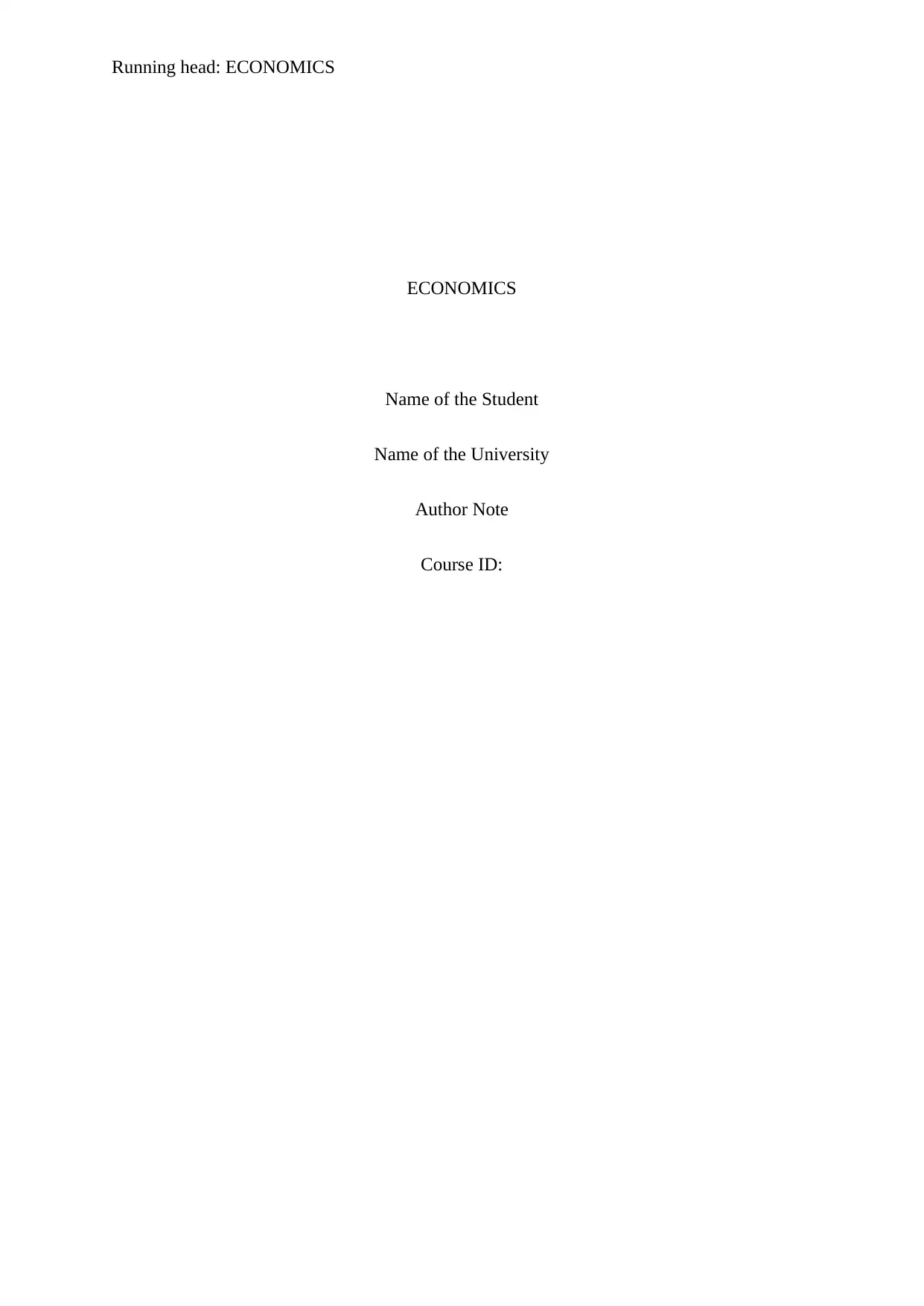
Running head: ECONOMICS
ECONOMICS
Name of the Student
Name of the University
Author Note
Course ID:
ECONOMICS
Name of the Student
Name of the University
Author Note
Course ID:
Paraphrase This Document
Need a fresh take? Get an instant paraphrase of this document with our AI Paraphraser
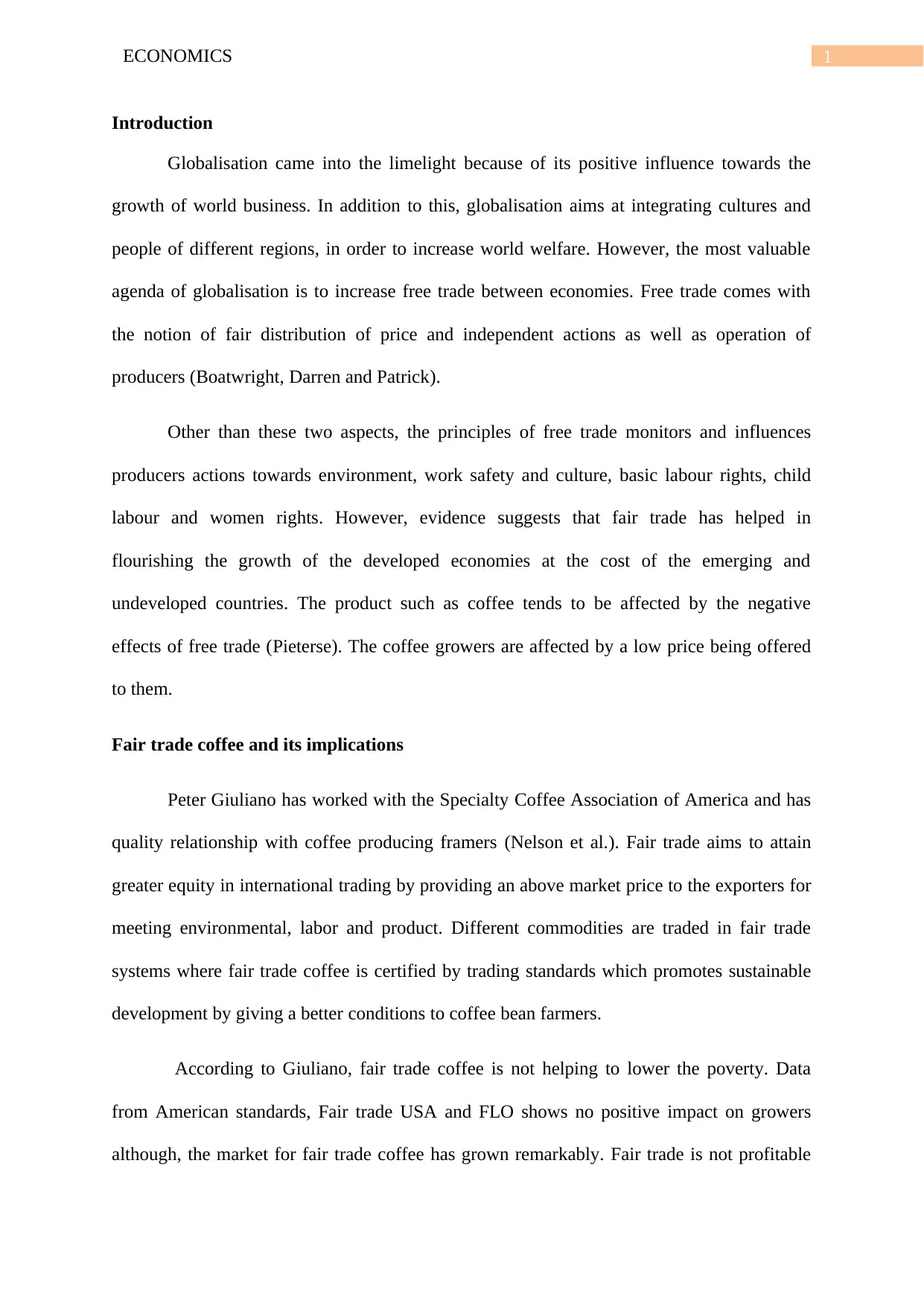
1ECONOMICS
Introduction
Globalisation came into the limelight because of its positive influence towards the
growth of world business. In addition to this, globalisation aims at integrating cultures and
people of different regions, in order to increase world welfare. However, the most valuable
agenda of globalisation is to increase free trade between economies. Free trade comes with
the notion of fair distribution of price and independent actions as well as operation of
producers (Boatwright, Darren and Patrick).
Other than these two aspects, the principles of free trade monitors and influences
producers actions towards environment, work safety and culture, basic labour rights, child
labour and women rights. However, evidence suggests that fair trade has helped in
flourishing the growth of the developed economies at the cost of the emerging and
undeveloped countries. The product such as coffee tends to be affected by the negative
effects of free trade (Pieterse). The coffee growers are affected by a low price being offered
to them.
Fair trade coffee and its implications
Peter Giuliano has worked with the Specialty Coffee Association of America and has
quality relationship with coffee producing framers (Nelson et al.). Fair trade aims to attain
greater equity in international trading by providing an above market price to the exporters for
meeting environmental, labor and product. Different commodities are traded in fair trade
systems where fair trade coffee is certified by trading standards which promotes sustainable
development by giving a better conditions to coffee bean farmers.
According to Giuliano, fair trade coffee is not helping to lower the poverty. Data
from American standards, Fair trade USA and FLO shows no positive impact on growers
although, the market for fair trade coffee has grown remarkably. Fair trade is not profitable
Introduction
Globalisation came into the limelight because of its positive influence towards the
growth of world business. In addition to this, globalisation aims at integrating cultures and
people of different regions, in order to increase world welfare. However, the most valuable
agenda of globalisation is to increase free trade between economies. Free trade comes with
the notion of fair distribution of price and independent actions as well as operation of
producers (Boatwright, Darren and Patrick).
Other than these two aspects, the principles of free trade monitors and influences
producers actions towards environment, work safety and culture, basic labour rights, child
labour and women rights. However, evidence suggests that fair trade has helped in
flourishing the growth of the developed economies at the cost of the emerging and
undeveloped countries. The product such as coffee tends to be affected by the negative
effects of free trade (Pieterse). The coffee growers are affected by a low price being offered
to them.
Fair trade coffee and its implications
Peter Giuliano has worked with the Specialty Coffee Association of America and has
quality relationship with coffee producing framers (Nelson et al.). Fair trade aims to attain
greater equity in international trading by providing an above market price to the exporters for
meeting environmental, labor and product. Different commodities are traded in fair trade
systems where fair trade coffee is certified by trading standards which promotes sustainable
development by giving a better conditions to coffee bean farmers.
According to Giuliano, fair trade coffee is not helping to lower the poverty. Data
from American standards, Fair trade USA and FLO shows no positive impact on growers
although, the market for fair trade coffee has grown remarkably. Fair trade is not profitable
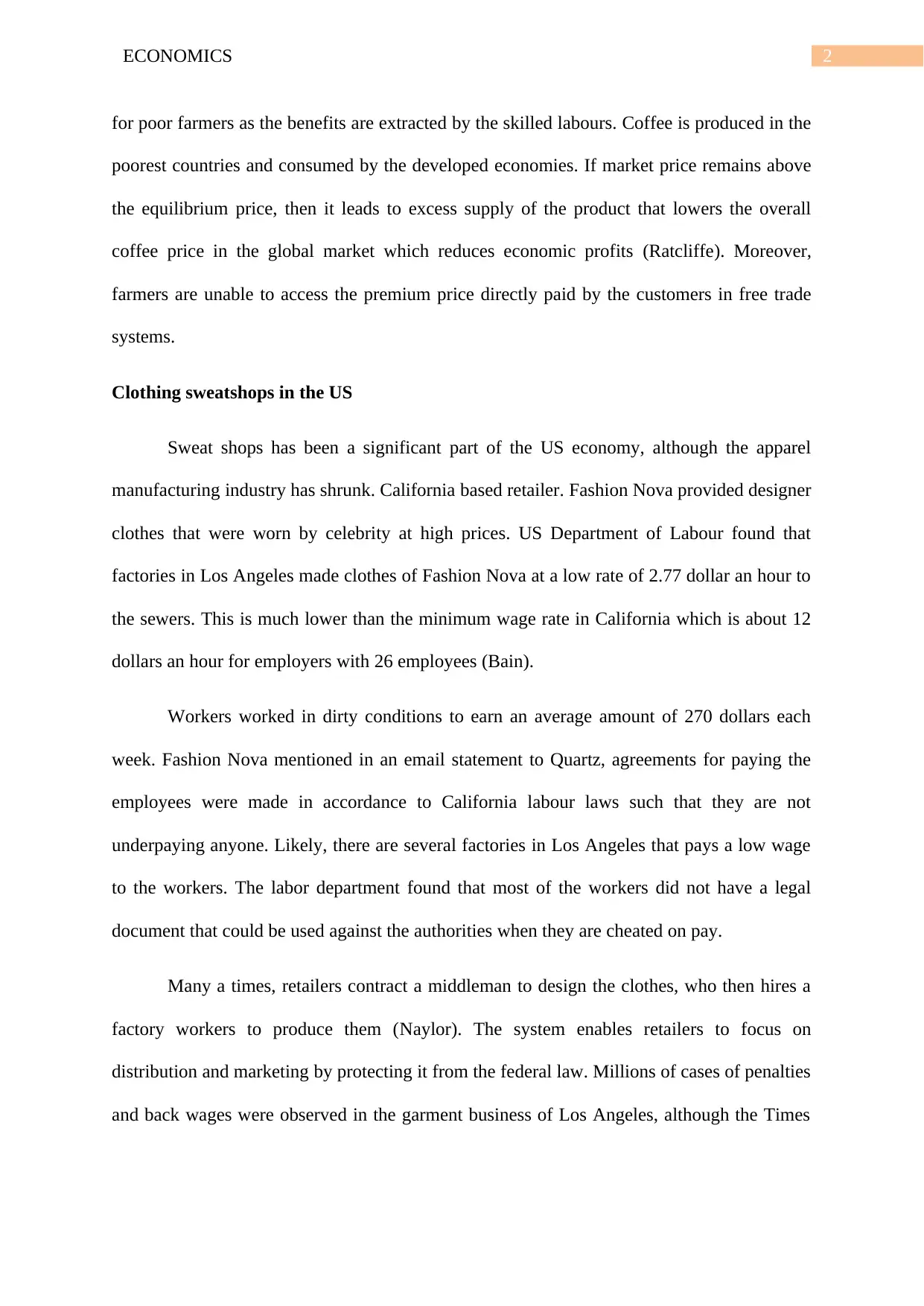
2ECONOMICS
for poor farmers as the benefits are extracted by the skilled labours. Coffee is produced in the
poorest countries and consumed by the developed economies. If market price remains above
the equilibrium price, then it leads to excess supply of the product that lowers the overall
coffee price in the global market which reduces economic profits (Ratcliffe). Moreover,
farmers are unable to access the premium price directly paid by the customers in free trade
systems.
Clothing sweatshops in the US
Sweat shops has been a significant part of the US economy, although the apparel
manufacturing industry has shrunk. California based retailer. Fashion Nova provided designer
clothes that were worn by celebrity at high prices. US Department of Labour found that
factories in Los Angeles made clothes of Fashion Nova at a low rate of 2.77 dollar an hour to
the sewers. This is much lower than the minimum wage rate in California which is about 12
dollars an hour for employers with 26 employees (Bain).
Workers worked in dirty conditions to earn an average amount of 270 dollars each
week. Fashion Nova mentioned in an email statement to Quartz, agreements for paying the
employees were made in accordance to California labour laws such that they are not
underpaying anyone. Likely, there are several factories in Los Angeles that pays a low wage
to the workers. The labor department found that most of the workers did not have a legal
document that could be used against the authorities when they are cheated on pay.
Many a times, retailers contract a middleman to design the clothes, who then hires a
factory workers to produce them (Naylor). The system enables retailers to focus on
distribution and marketing by protecting it from the federal law. Millions of cases of penalties
and back wages were observed in the garment business of Los Angeles, although the Times
for poor farmers as the benefits are extracted by the skilled labours. Coffee is produced in the
poorest countries and consumed by the developed economies. If market price remains above
the equilibrium price, then it leads to excess supply of the product that lowers the overall
coffee price in the global market which reduces economic profits (Ratcliffe). Moreover,
farmers are unable to access the premium price directly paid by the customers in free trade
systems.
Clothing sweatshops in the US
Sweat shops has been a significant part of the US economy, although the apparel
manufacturing industry has shrunk. California based retailer. Fashion Nova provided designer
clothes that were worn by celebrity at high prices. US Department of Labour found that
factories in Los Angeles made clothes of Fashion Nova at a low rate of 2.77 dollar an hour to
the sewers. This is much lower than the minimum wage rate in California which is about 12
dollars an hour for employers with 26 employees (Bain).
Workers worked in dirty conditions to earn an average amount of 270 dollars each
week. Fashion Nova mentioned in an email statement to Quartz, agreements for paying the
employees were made in accordance to California labour laws such that they are not
underpaying anyone. Likely, there are several factories in Los Angeles that pays a low wage
to the workers. The labor department found that most of the workers did not have a legal
document that could be used against the authorities when they are cheated on pay.
Many a times, retailers contract a middleman to design the clothes, who then hires a
factory workers to produce them (Naylor). The system enables retailers to focus on
distribution and marketing by protecting it from the federal law. Millions of cases of penalties
and back wages were observed in the garment business of Los Angeles, although the Times
⊘ This is a preview!⊘
Do you want full access?
Subscribe today to unlock all pages.

Trusted by 1+ million students worldwide
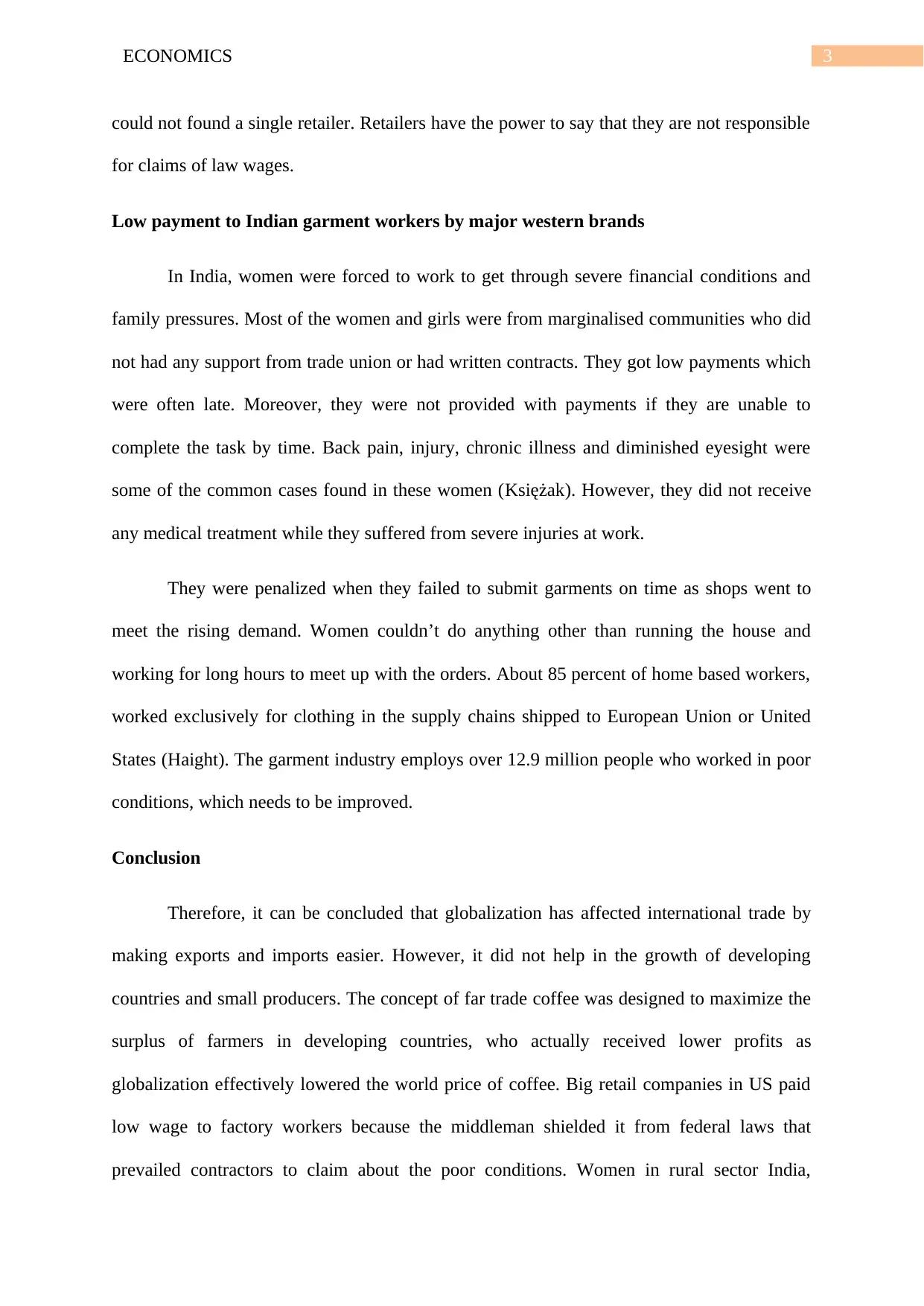
3ECONOMICS
could not found a single retailer. Retailers have the power to say that they are not responsible
for claims of law wages.
Low payment to Indian garment workers by major western brands
In India, women were forced to work to get through severe financial conditions and
family pressures. Most of the women and girls were from marginalised communities who did
not had any support from trade union or had written contracts. They got low payments which
were often late. Moreover, they were not provided with payments if they are unable to
complete the task by time. Back pain, injury, chronic illness and diminished eyesight were
some of the common cases found in these women (Księżak). However, they did not receive
any medical treatment while they suffered from severe injuries at work.
They were penalized when they failed to submit garments on time as shops went to
meet the rising demand. Women couldn’t do anything other than running the house and
working for long hours to meet up with the orders. About 85 percent of home based workers,
worked exclusively for clothing in the supply chains shipped to European Union or United
States (Haight). The garment industry employs over 12.9 million people who worked in poor
conditions, which needs to be improved.
Conclusion
Therefore, it can be concluded that globalization has affected international trade by
making exports and imports easier. However, it did not help in the growth of developing
countries and small producers. The concept of far trade coffee was designed to maximize the
surplus of farmers in developing countries, who actually received lower profits as
globalization effectively lowered the world price of coffee. Big retail companies in US paid
low wage to factory workers because the middleman shielded it from federal laws that
prevailed contractors to claim about the poor conditions. Women in rural sector India,
could not found a single retailer. Retailers have the power to say that they are not responsible
for claims of law wages.
Low payment to Indian garment workers by major western brands
In India, women were forced to work to get through severe financial conditions and
family pressures. Most of the women and girls were from marginalised communities who did
not had any support from trade union or had written contracts. They got low payments which
were often late. Moreover, they were not provided with payments if they are unable to
complete the task by time. Back pain, injury, chronic illness and diminished eyesight were
some of the common cases found in these women (Księżak). However, they did not receive
any medical treatment while they suffered from severe injuries at work.
They were penalized when they failed to submit garments on time as shops went to
meet the rising demand. Women couldn’t do anything other than running the house and
working for long hours to meet up with the orders. About 85 percent of home based workers,
worked exclusively for clothing in the supply chains shipped to European Union or United
States (Haight). The garment industry employs over 12.9 million people who worked in poor
conditions, which needs to be improved.
Conclusion
Therefore, it can be concluded that globalization has affected international trade by
making exports and imports easier. However, it did not help in the growth of developing
countries and small producers. The concept of far trade coffee was designed to maximize the
surplus of farmers in developing countries, who actually received lower profits as
globalization effectively lowered the world price of coffee. Big retail companies in US paid
low wage to factory workers because the middleman shielded it from federal laws that
prevailed contractors to claim about the poor conditions. Women in rural sector India,
Paraphrase This Document
Need a fresh take? Get an instant paraphrase of this document with our AI Paraphraser
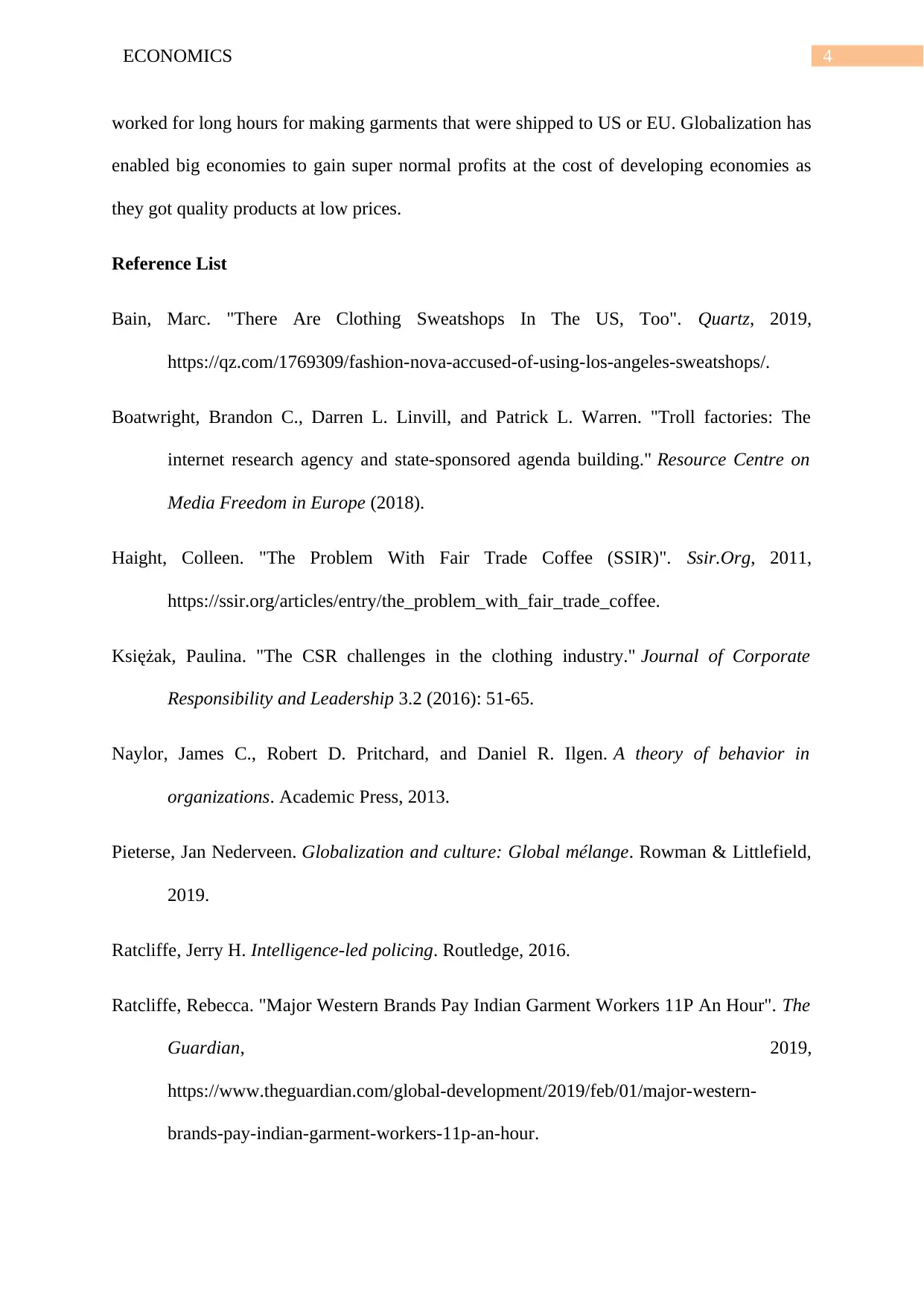
4ECONOMICS
worked for long hours for making garments that were shipped to US or EU. Globalization has
enabled big economies to gain super normal profits at the cost of developing economies as
they got quality products at low prices.
Reference List
Bain, Marc. "There Are Clothing Sweatshops In The US, Too". Quartz, 2019,
https://qz.com/1769309/fashion-nova-accused-of-using-los-angeles-sweatshops/.
Boatwright, Brandon C., Darren L. Linvill, and Patrick L. Warren. "Troll factories: The
internet research agency and state-sponsored agenda building." Resource Centre on
Media Freedom in Europe (2018).
Haight, Colleen. "The Problem With Fair Trade Coffee (SSIR)". Ssir.Org, 2011,
https://ssir.org/articles/entry/the_problem_with_fair_trade_coffee.
Księżak, Paulina. "The CSR challenges in the clothing industry." Journal of Corporate
Responsibility and Leadership 3.2 (2016): 51-65.
Naylor, James C., Robert D. Pritchard, and Daniel R. Ilgen. A theory of behavior in
organizations. Academic Press, 2013.
Pieterse, Jan Nederveen. Globalization and culture: Global mélange. Rowman & Littlefield,
2019.
Ratcliffe, Jerry H. Intelligence-led policing. Routledge, 2016.
Ratcliffe, Rebecca. "Major Western Brands Pay Indian Garment Workers 11P An Hour". The
Guardian, 2019,
https://www.theguardian.com/global-development/2019/feb/01/major-western-
brands-pay-indian-garment-workers-11p-an-hour.
worked for long hours for making garments that were shipped to US or EU. Globalization has
enabled big economies to gain super normal profits at the cost of developing economies as
they got quality products at low prices.
Reference List
Bain, Marc. "There Are Clothing Sweatshops In The US, Too". Quartz, 2019,
https://qz.com/1769309/fashion-nova-accused-of-using-los-angeles-sweatshops/.
Boatwright, Brandon C., Darren L. Linvill, and Patrick L. Warren. "Troll factories: The
internet research agency and state-sponsored agenda building." Resource Centre on
Media Freedom in Europe (2018).
Haight, Colleen. "The Problem With Fair Trade Coffee (SSIR)". Ssir.Org, 2011,
https://ssir.org/articles/entry/the_problem_with_fair_trade_coffee.
Księżak, Paulina. "The CSR challenges in the clothing industry." Journal of Corporate
Responsibility and Leadership 3.2 (2016): 51-65.
Naylor, James C., Robert D. Pritchard, and Daniel R. Ilgen. A theory of behavior in
organizations. Academic Press, 2013.
Pieterse, Jan Nederveen. Globalization and culture: Global mélange. Rowman & Littlefield,
2019.
Ratcliffe, Jerry H. Intelligence-led policing. Routledge, 2016.
Ratcliffe, Rebecca. "Major Western Brands Pay Indian Garment Workers 11P An Hour". The
Guardian, 2019,
https://www.theguardian.com/global-development/2019/feb/01/major-western-
brands-pay-indian-garment-workers-11p-an-hour.

5ECONOMICS
⊘ This is a preview!⊘
Do you want full access?
Subscribe today to unlock all pages.

Trusted by 1+ million students worldwide
1 out of 6
Your All-in-One AI-Powered Toolkit for Academic Success.
+13062052269
info@desklib.com
Available 24*7 on WhatsApp / Email
![[object Object]](/_next/static/media/star-bottom.7253800d.svg)
Unlock your academic potential
Copyright © 2020–2026 A2Z Services. All Rights Reserved. Developed and managed by ZUCOL.